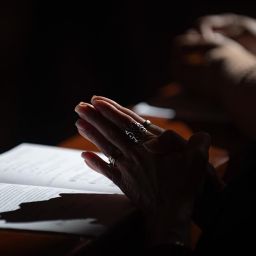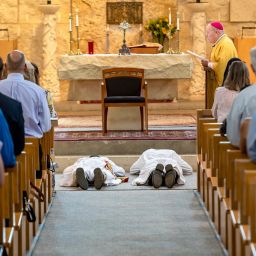Many of us today suffer from scrupulosity, which I think could be defined — at least insofar as it is a spiritual and not a psychological condition — as a disordered concern for one’s own righteousness. It is ‘disordered’ because it is marked by a desire to guarantee, for oneself, one’s own justification; it is a desire to certify, or even to cause, one’s own justification through a meticulous analysis and control over one’s every thought and action. The problem with this desire is at least twofold: First, it misunderstands human nature by presuming that every thought or impulse we experience is a moral act and by presuming that we can achieve absolute analytical certainty in our examination of conscience; second, it misunderstands the Gospel by presuming, in a Pelagian way, that we can eventually secure our justification by transparent self-examination and meticulous self-control, rather than by reliance upon the mysterious mercy of God that transcends our understanding.
In my experience, people who suffer from scrupulosity can suffer a great deal psychologically and spiritually. Psychologically, I think they suffer the more their scrupulosity can be classified as an obsessive-compulsive disorder, or the more their suffering can be characterized by a difficulty in accepting intrusive thoughts peacefully and by the compulsion to perform rituals to try to soothe inner discomfort. Spiritually, I think we will suffer the more our scrupulosity traps us within a rule-based way of life, or a way of relating to God as if He were a set of laws rather than as He truly is: a loving Father, who indeed challenges us to rise to His own perfection (cf. Mt 5:48), but who also knows our weaknesses and longs to love us while we are still unrighteous precisely in order to make us righteous (cf. Rm 5:8-11). Like the father of the prodigal son, the Father of Jesus Christ — who is also our Father in Jesus (cf. Jn 20:17) — loves us all the way home, even while we are “still a long way off” (Lk 15:20).
But although they suffer, scrupulous people (and at the end of the day, I suspect that’s all of us to varying degrees) have a tremendous opportunity. In truth, God is able to draw good from all our suffering (cf. Rm 8:28), and all our trials can be counted as a “joy” or as a test of faith that “produces perseverance” and leads to our becoming “perfect and complete, lacking in nothing” (Jas 1:2-4). The scrupulous person can reach a special insight into the beauty of the Gospel and Jesus’ promise, “Peace I leave with you, my peace I give you” (Jn 14:27). Their suffering teaches them to long for the peace of Christ; and their longing conforms them to the Beatitude: “Blessed are they who hunger and thirst for righteousness, for they will be satisfied” (Mt 5:6). Having spent so much energy trying to find an autonomous path to peace, they are likely exhausted and hungry — and therefore primed for a tremendous act of spiritual surrender. If you have ever experienced the physical thrill of a trust fall (i.e., of letting yourself fall backwards to be caught under your arms by a friend), then you have some analogy for what it is like when the scrupulous person (or any of us) learns — precisely in the moment of anxious self-concern — to look at St. Faustina’s image of Divine Mercy, to acknowledge our concupiscent desire to trust in ourselves, and then to say, with all the imperfection of a pilgrim, Jesus, I cannot see how I am today worthy of Heaven. So, I do not trust in myself but in your generous love. Now, at last, I know what it means to say, ‘Jesus, I trust in you.’ Please, help me to be patient with myself, and with the slow, patient way you care for me; and make me perfect by giving me all the trials I need to grow day by day. I accept that I will often not understand your timing and plans for my growth. But no matter, for I trust you!
If you or someone you know suffers from scrupulosity, I would encourage you to read and give as a gift “Scrupulosity: Heal Your Mind, Unbind Your Soul, and Let God Work” (Our Sunday Visitor, 2023) by Kevin Vost, PsyD. I think Vost is fantastic. I’ve read several of his books, and he seems to me like an author who models the real spirit of Vatican II: he is faithful to the Church and drinks deeply from her Magisterium and Tradition (he quotes Aquinas and other saints on nearly every page); his intellectual seriousness gives him a greater ability to be pastorally sensitive and prudent (thus, he overcomes the alleged opposition between the Church’s theological and pastoral efforts); and he appears, at least to me, very well educated and articulate about an important area of secular experience (namely, psychology), and therefore poised to help the Church engage the modern world.
In “Scrupulosity,” Vost outlines the spiritual life (or the life of virtue, sacraments, and prayer) through the lens of someone striving to overcome scrupulosity. Each chapter is shaped by sections detailing the teaching of the Church, the witness of the saints, and helpful insights from science and clinical psychology. At the end of the book, he offers a beautiful prayer that seems to me to be very precisely composed in a way that recalls many important truths and gives the heart the satisfaction of praying with understanding (just like the prayers written by Aquinas).
Father John Bayer, O. Cist., is a monk at the Cistercian Abbey of Our Lady of Dallas in Irving.















